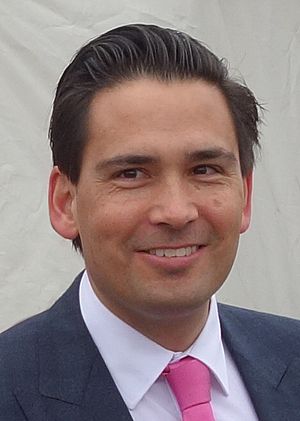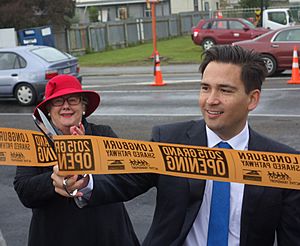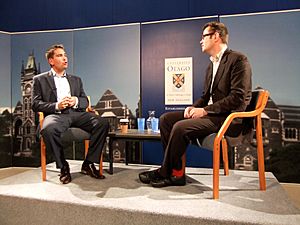Simon Bridges facts for kids
Quick facts for kids
Simon Bridges
|
|
|---|---|

Bridges in 2015
|
|
| 37th Leader of the Opposition | |
| In office 27 February 2018 – 22 May 2020 |
|
| Prime Minister | Jacinda Ardern |
| Deputy | Paula Bennett |
| Preceded by | Bill English |
| Succeeded by | Todd Muller |
| 12th Leader of the National Party | |
| In office 27 February 2018 – 22 May 2020 |
|
| Deputy | Paula Bennett |
| Preceded by | Bill English |
| Succeeded by | Todd Muller |
| 10th Shadow Leader of the House | |
| In office 2 November 2017 – 27 February 2018 |
|
| Leader | Bill English |
| Preceded by | Chris Hipkins |
| Succeeded by | Gerry Brownlee |
| 10th Leader of the House | |
| In office 2 May 2017 – 26 October 2017 |
|
| Prime Minister | Bill English |
| Deputy | Michael Woodhouse |
| Preceded by | Gerry Brownlee |
| Succeeded by | Chris Hipkins |
| Minister of Economic Development | |
| In office 20 December 2016 – 26 October 2017 |
|
| Prime Minister | Bill English |
| Preceded by | Steven Joyce |
| Succeeded by | David Parker |
| 26th Minister of Transport | |
| In office 6 October 2014 – 26 October 2017 |
|
| Prime Minister | John Key Bill English |
| Preceded by | Gerry Brownlee |
| Succeeded by | Phil Twyford |
| 24th Minister for Communications | |
| In office 20 December 2016 – 26 October 2017 |
|
| Prime Minister | Bill English |
| Preceded by | Amy Adams |
| Succeeded by | Clare Curran (Communications and Digital Media) |
| Member of the New Zealand Parliament for Tauranga |
|
| In office 8 November 2008 – 6 May 2022 |
|
| Preceded by | Bob Clarkson |
| Succeeded by | Sam Uffindell |
| Majority | 1,856 |
| Personal details | |
| Born |
Simon Joseph Bridges
12 October 1976 Auckland, New Zealand |
| Political party | National |
| Relations | Simon O'Connor (brother-in-law) |
| Education | University of Auckland (BA, LLB) London School of Economics St Catherine's College, Oxford (BCL) |
Simon Joseph Bridges (born 12 October 1976) is a New Zealand former politician, broadcaster, and lawyer. He was the leader of the National Party and the Leader of the Opposition from 2018 to 2020. He also served as the Member of Parliament (MP) for Tauranga from 2008 until he left politics in May 2022. Simon Bridges is the first and only Māori person to lead a major political party in New Zealand.
Bridges held several important roles in the government. These included Minister of Transport (2014–2017) and Minister of Economic Development (2016–2017). He also served as the Leader of the House from May to October 2017. He became the leader of the National Party on 27 February 2018, taking over from former Prime Minister Bill English. On 22 May 2020, after his party's popularity dropped in surveys, Bridges was replaced as leader by Todd Muller.
In November 2021, Bridges was removed from the group of National Party spokespeople by then-leader Judith Collins. This happened after an old issue from 2016 involving a comment he made to another MP, Jacqui Dean, was brought up again. Bridges had already apologised for this comment privately. Collins' decision led to a vote by the National Party MPs, who decided they no longer had confidence in her leadership. Bridges planned to run for the leadership again but later decided not to, supporting Christopher Luxon instead.
Bridges announced in March 2022 that he was leaving politics to spend more time with his family. This led to a special election in Tauranga. After leaving Parliament, he became the CEO of the Auckland Business Chamber. He also started a podcast called Generally Famous in 2022 and became the Chairperson of Waka Kotahi in 2024.
Contents
Early Life and Education
Simon Bridges was born in Auckland in October 1976. He was the youngest of six children. His father, who was part Māori and part Pākehā (New Zealand European), was a Baptist minister. His mother, a Pākehā from Waihi, was a primary school teacher. Simon's father's mother, Naku Joseph, was from the Ngāti Kinohaku hapū (subtribe) of the Ngāti Maniapoto tribe. This connection links Bridges to Oparure Marae near Te Kūiti.
Bridges grew up in Te Atatū, West Auckland. He went to Rutherford College, where he was taught by Chris Carter, who later became a Labour Education Minister. Bridges became the head boy of the college. He then studied at the University of Auckland, earning degrees in political science, history, and law. He also studied law in the United Kingdom at the London School of Economics and Political Science and St Catherine's College, Oxford.
Legal Career
Bridges started his career as a lawyer at a large law firm in Auckland called Kensington Swan. In 2001, he moved to Tauranga to work as a Crown prosecutor. This meant he represented the government in court cases. During this time, he took a break to study in the United Kingdom and worked as an intern in the British House of Commons. As a Crown prosecutor in Tauranga, he mostly worked on jury trials. Bridges stopped working as a lawyer in 2008 when he was chosen by the National Party to run for Parliament.
Early Political Steps
Simon Bridges joined the Young Nationals when he was 16, in 1992. He was elected Deputy New Zealand Chair in 1997. He was very involved in the National Party's activities in West Auckland. Bridges also held several important roles within the party, including being on the party's rules committee and leading the Tauranga National Party branch.
Member of Parliament
| New Zealand Parliament | ||||
| Years | Term | Electorate | List | Party |
| 2008–2011 | 49th | Tauranga | 51 | National |
| 2011–2014 | 50th | Tauranga | 30 | National |
| 2014–2017 | 51st | Tauranga | 18 | National |
| 2017–2020 | 52nd | Tauranga | 6 | National |
| 2020–2022 | 53rd | Tauranga | 4 | National
|
Becoming an MP: 2008–2011
In 2008, the MP for Tauranga, Bob Clarkson, announced he would not run for re-election. Bridges decided to try and become the National Party's candidate for that area. He was chosen as the candidate in June 2008. Bridges was also placed at number 51 on National's party list, which is another way to get into Parliament.
Bridges won the Tauranga seat with a large lead of 11,742 votes. He beat 11 other candidates, including New Zealand First leader Winston Peters.
Bridges supported a special type of bill called a Private Member's Bill. This bill aimed to increase punishments for animal cruelty. It was later taken over by the government and became law.
Government Minister: 2012–2017
Bridges was re-elected as the MP for Tauranga in the 2011 election election. In April 2012, Prime Minister John Key made him a Minister outside the main Cabinet. He became Minister for Consumer Affairs and an Associate Minister for Transport and Climate Change Issues. In January 2013, Bridges joined the main Cabinet. He became Minister of Labour and Minister of Energy and Resources.
Bridges often appeared on TVNZ's Breakfast show. He was part of a segment called "Young Guns" with Labour MP Jacinda Ardern.
In April 2013, Bridges voted against a bill that allowed same-sex couples to marry in New Zealand.
In October 2013, Bridges had a strong discussion on the TV show Campbell Live. He and presenter John Campbell debated the pros and cons of drilling for oil offshore.
In April 2014, an environmental group called Greenpeace asked for Bridges to be removed as Energy and Resources Minister. They claimed he had approved oil and gas exploration in a sensitive area without knowing it. Bridges and Prime Minister John Key denied this.

In March 2015, during a special election in Northland, Bridges announced a plan to upgrade 10 one-lane bridges. This would cost up to $69 million. Some people criticised the government for making this announcement so close to the election. However, John Key said it was allowed because Bridges was only asking for facts, not policy advice.
After John Key resigned as Prime Minister in December 2016, Bridges wanted to become the Deputy Leader of the National Party. He decided not to run when it became clear that Paula Bennett had more support.
When Bill English became the new Prime Minister in December 2016, he changed the Cabinet roles. Bridges became Minister for Economic Development, Minister for Communications, and an Associate Minister of Finance. He continued as Minister of Transport.
In Opposition: 2017–2022
Simon Bridges was re-elected in the 2017 election election. After the National government lost the election, Bridges was no longer a minister. He became the Shadow Leader of the House. He also became the National Party's spokesperson for Economic and Regional Development and Immigration. Bridges hoped to become New Zealand's first Māori prime minister.
In February 2018, Bill English stepped down as the leader of the National Party. Bridges announced he would run for the leadership. On 27 February 2018, he was chosen as the new leader of the National Party. This also made him the Leader of the Opposition. He was the first person with Māori heritage to lead the National Party. Paula Bennett became his deputy.
MP Expenses and a Leak
In August 2018, news reports showed that Bridges had spent money on travel and hotels. This information came from a leak of MPs' expenses. The National Party asked for an independent investigation to find out who leaked the information. Bridges said he was sure no one from his own party was behind the leak. The Speaker of the House, Trevor Mallard, started an investigation.
Later, someone claiming to be the leaker sent anonymous messages. They asked for the investigation to stop, saying they had mental health problems. Mallard then stopped the investigation. Bridges and other National MPs were unhappy and wanted the investigation to continue.
In October 2018, Bridges suggested that National MP Jami-Lee Ross was the leaker. This was based on a report that looked at text messages sent to a reporter, the Speaker, and a police officer. Bridges also denied claims from Ross that he was trying to blame him. The National Party MPs then voted to remove Ross from the party. Ross decided to stay in Parliament as an independent MP.
In January 2020, the Serious Fraud Office filed charges against four people. This was about a large donation to a National Party bank account. Bridges stated that he and no one from the National Party were among those charged. The Serious Fraud Office started their investigation in March 2019 after Ross made a complaint to the police.
During the COVID-19 Pandemic
In March 2020, Bridges led a special committee of MPs from different parties. This committee looked closely at how the government was handling the COVID-19 pandemic in New Zealand. This committee met while Parliament was not in session.
In April, Bridges received media attention for travelling between Tauranga and Wellington. He was chairing the committee, even though its meetings were held online. He said he needed to be in Wellington for resources and media access.
In April, Simon Bridges asked the New Zealand Government to end the strict lockdown. He wanted to help businesses that were struggling. Some people did not agree with his view.
Leadership Change in 2020
In May 2020, a public opinion poll showed that Bridges's popularity as Prime Minister was low. The National Party's support was also low, while Prime Minister Ardern and the Labour Party were very popular. Because of these low numbers, National MPs Todd Muller and Nikki Kaye challenged Bridges for the leadership. An urgent meeting of National Party MPs was held on 22 May. Bridges lost his position as leader of the National Party and Leader of the Opposition.
Roles After Leadership
After Todd Muller became leader, Bridges was given the foreign affairs role in the new group of National Party spokespeople. He was also moved to number 17 on the National Party list.
When Judith Collins became leader, Bridges moved up to number four on the National Party List. He kept his foreign affairs role and also became the spokesperson for justice.
In the 2020 New Zealand general election, Bridges kept his seat in Tauranga. He won by 1,856 votes. After the election, he became the spokesperson for justice, water, the Pike River Mine re-entry, and Māori–Crown relations.
In February 2021, Bridges criticised Police Commissioner Andrew Coster's efforts to deal with gang and gun violence. Bridges called Coster a "wokester commissioner" on Twitter. In June 2021, Bridges again criticised Coster, claiming he saw a gang fight in a Tauranga hospital car park. Police confirmed an argument happened but said it was not gang-related.
In August 2021, Bridges published a book called National Identity: Confessions of an Outsider.
In November 2021, Bridges was removed from Judith Collins' group of spokespeople. This happened amid talk that he might challenge Collins for the leadership. Collins said it was due to an old issue from 2017 involving another MP, Jacqui Dean. Bridges called Collins' action "desperate." He admitted he had made some "clearly inappropriate" comments around Dean.
Collins' decision led to a vote of no confidence in her leadership by the National Party MPs on 25 November. Shane Reti became the temporary leader, and a new leadership vote was set for 30 November.
Supporting Christopher Luxon
Bridges first said he would run for the leadership of the National Party. However, he later withdrew and supported Christopher Luxon on 30 November. Luxon was then elected as the new leader. In Luxon's team, Bridges was given the number 3 spot and the important roles of Finance and Infrastructure spokesperson.
Bridges was one of only eight MPs who voted against the Conversion Practices Prohibition Legislation Act 2022 in February 2022.
Leaving Politics
Bridges announced in March 2022 that he was leaving politics. He wanted to spend more time with his family and explore new job opportunities. This led to a special election in Tauranga. Bridges later shared that his decision to retire was because his son Harry had a serious liver injury in December 2021. His retirement became official on 6 May 2022.
After Parliament
In 2022, Bridges moved to Auckland. He became the CEO and spokesperson for the Auckland Business Chamber. He also started working with Stuff New Zealand on an audio deal. His podcast, Generally Famous, began in August 2022.
On 11 March 2024, Bridges was appointed as a member and chairperson of the New Zealand Transport Agency Board for three years.
Personal Life
Bridges grew up in a Christian family and has been a Christian since he was about 12 or 13. He met his wife, Natalie, who is a public relations consultant from Britain, while she was studying at the University of Oxford. They have two sons, born in 2012 and 2014, and a daughter, born in 2017. The family lived in Matua, Tauranga. In 2008, he attended Holy Trinity Tauranga, an Anglican church.
Bridges has a personal superannuation scheme, like many other New Zealanders, including some MPs.
Bridges's sister, Rachel Trimble, married National MP Simon O'Connor in December 2016.
 | Calvin Brent |
 | Walter T. Bailey |
 | Martha Cassell Thompson |
 | Alberta Jeannette Cassell |


